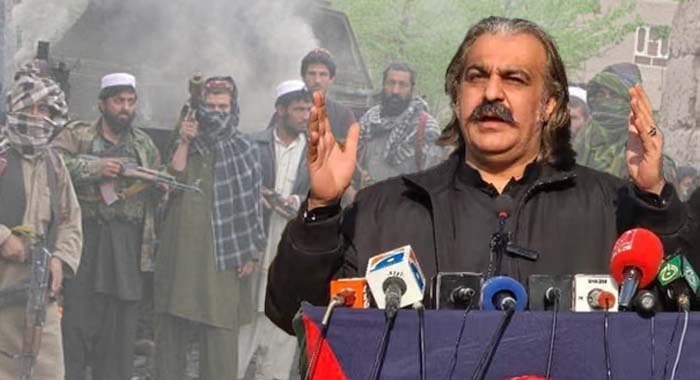Khyber Pakhtunkhwa Chief Minister Ali Amin Gandapur has, once again, held Islamabad and past national security policies responsible for today’s militancy, but critics say his remarks reflect an attempt to mask his own government’s inability to improve law and order in the province he governs.
Speaking to reporters in Islamabad, Gandapur said KP’s unrest stemmed from decades-old decisions to support Afghan Mujahideen. “For forty years we called them Mujahideen and Ghazis, celebrated their victories, and now we are left fighting them in our streets,” he stated.
Instead of presenting a clear security roadmap, Gandapur repeatedly pointed fingers at the federation, U.S. policies, and Afghan refugees. He questioned why Afghanistan’s nationals were not granted citizenship and blamed India for targeting tribal populations yet offered little explanation for why his own provincial forces have failed to prevent daily attacks.
Observers note that despite being in power for over a year, Gandapur has struggled to deliver on counterterrorism. Police morale is low, resources are mismanaged, and gaps in recruitment remain unaddressed. His acknowledgment that “five to six soldiers and two police officers are martyred every day” underscores the depth of the crisis under his watch.
The chief minister claimed the province was purchasing M4 rifles, bulletproof vehicles, and constructing new police stations. However, critics argue such projects are either still on paper or too slow to counter an urgent and escalating threat. Even Gandapur admitted police still lack basic equipment like snipers and thermal guns.
Blaming Islamabad for not providing 92 officers may resonate politically, but responsibility for law and order lies squarely with his provincial government.
By invoking India, Daesh, and U.S. policies, Gandapur painted a picture of an externally driven crisis while downplaying his government’s role in securing local communities. His comments that “terrorists were a gift of past policies” may be true historically, but they offer little comfort to citizens demanding present-day protection from bombings and assassinations.
Ground reports show that militancy in Bajaur, Dir, and Waziristan continues to destabilize daily life. Despite Gandapur’s assurances that “terrorism will not be tolerated,” police have staged protests over lack of support, while communities complain of inadequate security presence.
Critics argue that the chief minister’s rhetoric is designed more for deflecting responsibility than for charting solutions. As one security analyst put it: “Blaming Islamabad is easy politics, but fighting terror on the ground requires competence, which the KP government has yet to demonstrate.”





